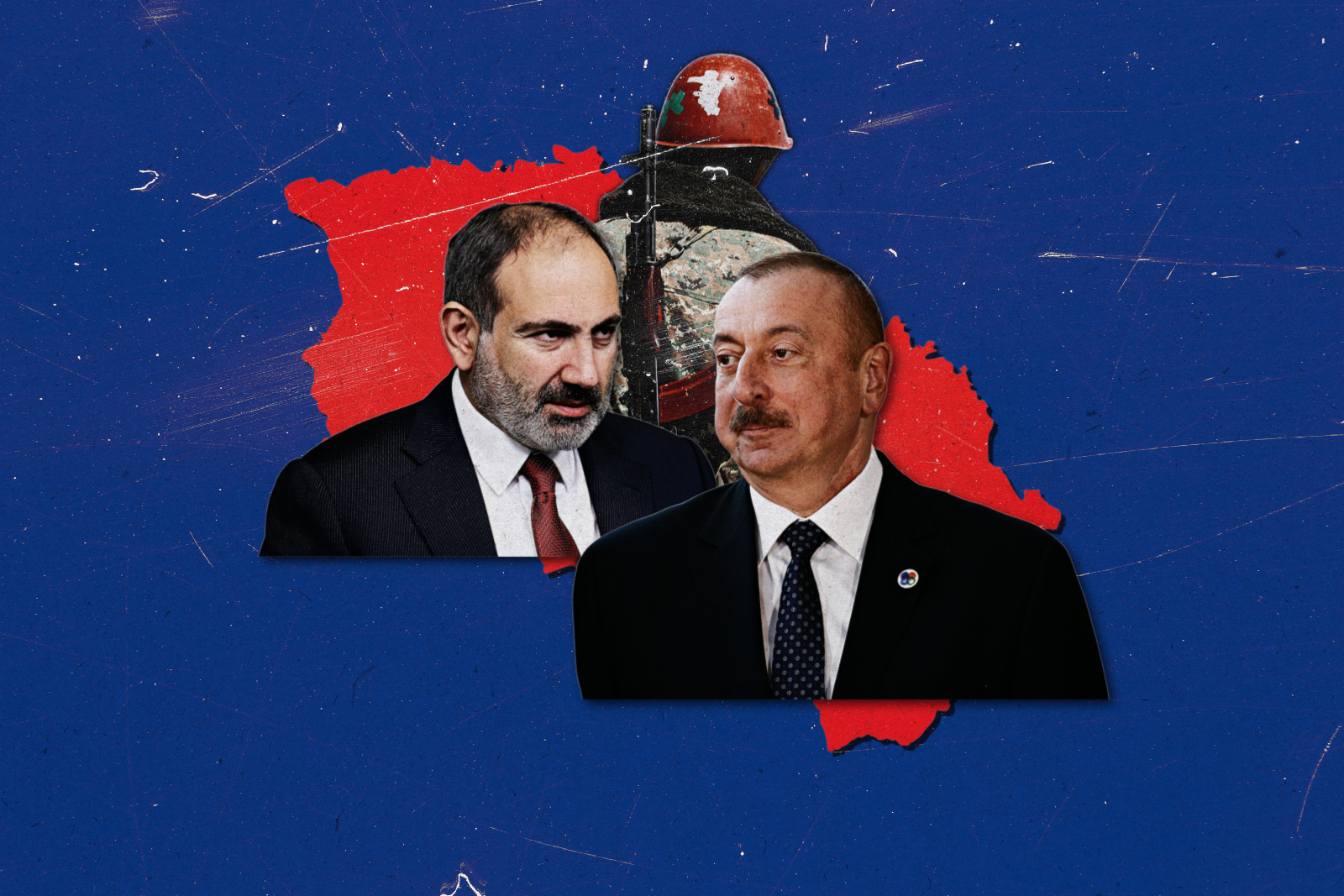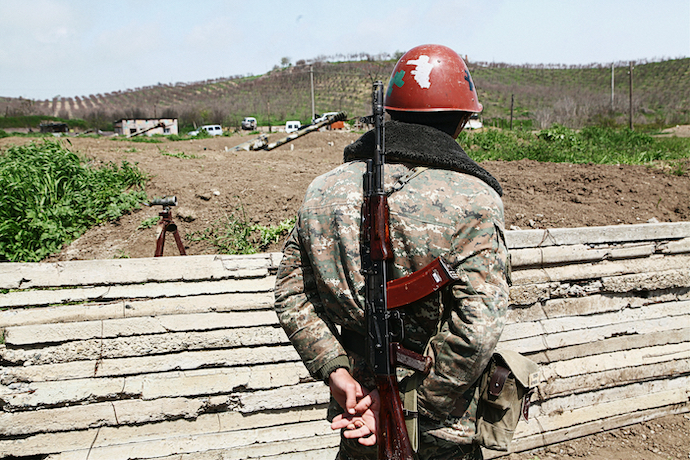
Is There a Way Out of the Impasse over Nagorno-Karabakh?
In October 2022, following intense clashes in Nagorno-Karabakh, European Union-led talks resulted in Brussels deploying a two-year civilian peacekeeping mission to Armenia with the “objective of monitoring, analyzing, and reporting on the situation in the region.”
However, since December 2022, an Azerbaijani blockade of the Lachin corridor, the only road connecting the breakaway republic of Artsakh to Armenia, has cut off the 120,000 Armenians living there. In March, because of Armenian shelling of Azerbaijani military positions, Azerbaijan accused Armenia of escalating tensions.
Armenia, the victim of the first modern genocide during the First World War, is desperately searching for a solution to end the blockade. Artsakh is overwhelmingly Armenian, and Armenian is the dominant language spoken there. Armenian Prime Minister Nikol Pashinyan has stated that the crisis is a pretext for “ethnic cleansing” of Karabakh Armenians. On top of this, Azerbaijani President Ilham Aliyev recently said that “Armenia lost its chance to become an independent state.” Azerbaijan’s actions have led the UN’s top court to order Azerbaijan to allow free passage through the corridor.
However, Azerbaijan continues to deny responsibility for the blockade led by “environmental activists.” They claim to be protesting the alleged illegal mining of natural resources in Nagorno-Karabakh and the Armenian transfer of arms into the region. In March, Azerbaijani suspicions of arms transfers to Artsakh led to clashes between Karabakh-Armenian police and the Azerbaijani military, which led to five people being killed. As a result, Armenia is concerned that Azerbaijan is signaling further military escalation. These concerns were confirmed in March when Russia accused Azerbaijan of violating the 2020 Russian-brokered ceasefire when Azerbaijani forces crossed the demarcation line.
For some observers, it appears that Brussels is beholden to Azerbaijan because of a recent energy agreement. The agreement will see Azerbaijani energy supplies circumvent Russia, which would double gas imports to 20 billion cubic meters annually by 2027. But how will Brussels balance condemning Azerbaijani actions while maintaining close energy ties with the country?
For the EU, investing diplomatic capital to end the blockade should take priority over energy cooperation. Moreover, while the United States and Russia have had high-level contact with Armenian and Azerbaijani officials, Brussels could play a unique neutral role. Rather than the U.S. getting involved, the EU is the ideal peace broker, given that Austria, Lithuania, and Romania helped launch the EU’s mediation efforts after the 2020 war.

These European countries have a vested interest in avoiding the geopolitical implications of a spillover of the conflict. Olaf Scholz, Germany’s Chancellor, led the charge to find a solution to end the Azerbaijani blockade. Scholtz emphasized that it is “important to reach a peaceful solution based on the principles of territorial integrity and sovereignty of Armenia and Azerbaijan, the right of the people of Nagorno-Karabakh to self-determination.”
Europe has leverage over Azerbaijan as the country relies on European expertise to operate its most significant energy projects, like the BP-operated Shah Deniz field, which is Azerbaijan’s largest natural gas field. BP also plays a critical role in maintaining the Baku-Tbilisi-Ceyhan pipeline, Baku’s main route to transport energy to foreign markets, and owns the largest share of the project. While it is helpful that Azerbaijan is exporting energy to European markets, the United States has most significantly aided in stabilizing Europe’s energy needs. Azerbaijan’s contributions are minuscule in comparison. Preventing the escalation of the Nagorno-Karabakh conflict should take precedence over energy projects.
Above all else, the potential for increased involvement of Russia, Iran, and Turkey should alarm Brussels. Russia’s involvement as a “peacekeeper” in Nagorno-Karabakh has done little to curb violence. Moscow has used the conflict to expand its influence and profit by selling weapons to both sides. Additionally, the Nagorno-Karabakh conflict may serve as a proxy battleground for Iran and Turkey, who support Armenia and Azerbaijan, respectively. Over the past two years, the Iranian army and the Islamic Revolutionary Guard Corps (IRGC) have conducted large-scale military drills along the border with Azerbaijan and practiced crossing the Aras River, which separates the two states. The provocative involvement of middle powers and increase in arms sales to both sides will only fuel the fire and increase the devastation wrought by the conflict.
The EU’s monitoring mission is not without controversy, as the Kremlin said that it will “only bring the geopolitical confrontation to the region and exacerbate existing contradictions.” However, from the Armenian point of view, Russian “peacekeepers” that remain in Karabakh have done little to reduce the pressure from Baku on Yerevan to sign a comprehensive peace agreement that would restore Azerbaijan’s control over Karabakh. The passivity of the remaining Russian peacekeepers has resulted in Karabakh Armenians organizing protests against the Russian military and alleging that Russia is conspiring with Azerbaijan. In addition, frustration from Armenia has led Yerevan to doubt the effectiveness of the Collective Security Treaty Organization (CSTO) alliance, of which Russia and Armenia are members.
Russia’s influence over Azerbaijan is waning as well. Azerbaijan openly attacked a CSTO member in 2022, ignoring the fact that Armenia is under Russia’s security umbrella. Azerbaijan has taken advantage of Russia being distracted in Ukraine and described Artsakh as a Russian puppet state in the heart of the Caucasus.
To make matters more complicated, Ukraine is an ardent supporter of Azerbaijan due to Armenia’s security alliance with Russia and Azerbaijan’s recent defiance of Russian influence. Azerbaijan is Ukraine’s only serious strategic ally in defending its sovereignty, and Baku can gain political clout from the West by supporting Ukraine. Meanwhile, Armenia has few partners to rely on to avoid future aggression from Azerbaijan.
If Armenia is willing to refrain from sending arms to their stranded population through the Lachin corridor, Azerbaijan must end the blockade. Additionally, including Iran and Turkey in the negotiating process might help to keep the conflict from expanding and alleviate the humanitarian crisis more quickly.
Azerbaijan’s role as an energy supplier is welcome news for Europe as they continue to find ways to maximize their energy security amid the Western economic sanctions on Russia. However, this should not stand in the way of the EU mitigating a humanitarian crisis and a potential threat to its security. Brussels should prioritize searching for a peaceful solution to the Nagorno-Karabakh conflict before it becomes an even greater security liability.

